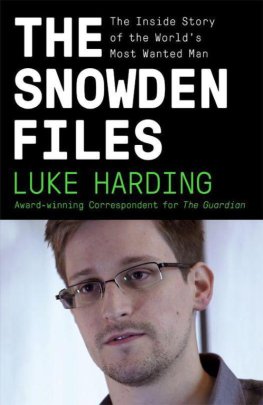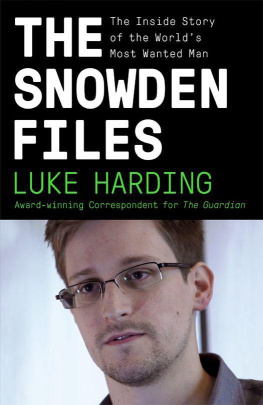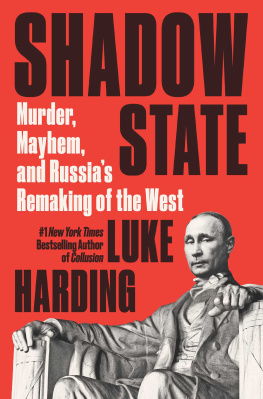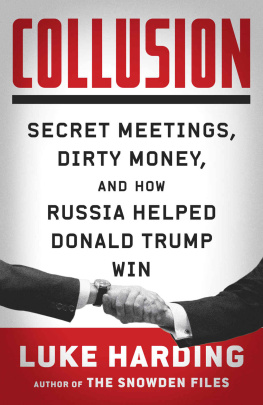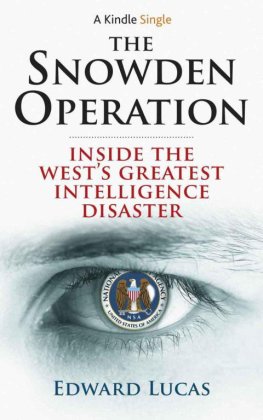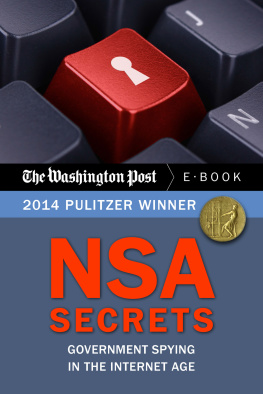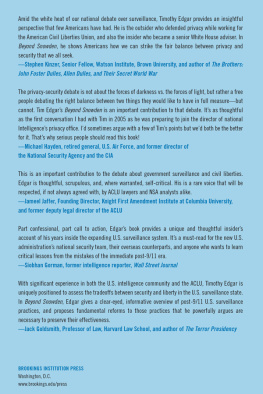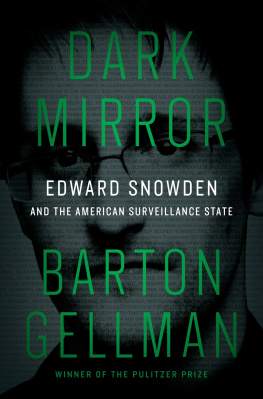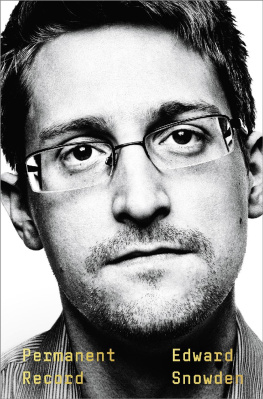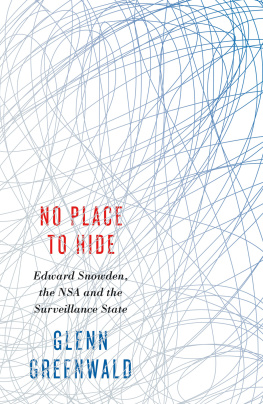Luke Harding
THE SNOWDEN FILES
The Inside Story of the Worlds Most Wanted Man

Edward Snowden is one of the most extraordinary whistleblowers in history. Never before has anyone scooped up en masse the top-secret files of the worlds most powerful intelligence organisations, in order to make them public. But that was what he did.
His skills are unprecedented. Until the present generation of computer nerds came along, no one realised it was possible to make off with the electronic equivalent of whole libraries full of triple-locked filing cabinets and safes thousands of documents and millions of words.
His motives are remarkable. Snowden set out to expose the true behaviour of the US National Security Agency and its allies. On present evidence, he has no interest in money although he could have sold his documents to foreign intelligence services for many, many millions. Nor does he have the kind of left-wing or Marxist sentiments which could lead to him being depicted as un-American. On the contrary, he is an enthusiast for the American constitution, and, like other fellow hacktivists, is a devotee of libertarian politician Ron Paul, whose views are well to the right of many Republicans.
What Snowden has revealed is important. His files show that the methods of the intelligence agencies that carry out electronic eavesdropping have spiralled out of control, largely thanks to the political panic in the US which followed the terrorist attacks of 9/11.
Let off the legal leash and urged to make America safe, the NSA and its British junior partner, the Government Communications Headquarters, GCHQ (secretly allied with the internet and telecommunications giants who control the hardware), have used all their technical skills to master the internet. That is their phrase, not ours. Democratic control has been vague, smothered in secrecy and plainly inadequate.
The result has been a world that is spied on. The technologies that the west has trumpeted as forces for individual freedom and democracy Google, Skype, mobile phones, GPS, YouTube, Tor, e-commerce, internet banking and all the rest are turning into machines for surveillance that would have astonished George Orwell, the author of 1984.
The Guardian was, I am glad to say, first among the free press to publish Snowdens revelations. We saw it as our duty to break the taboos of secrecy, with due regard, as Snowden himself wanted, to the safety of individuals and the protection of genuinely sensitive intelligence material.
I am proud we did so: fierce debate and demands for reform have been now launched across the world in the US itself, in Germany, France, Brazil, Indonesia, Canada, Australia, even in deferential Britain. The Guardian was eventually forced to publish from the safety of its New York division, because of British legal harassment. I think that readers of this book might well see the value of introducing a UK equivalent to the first amendment of the US constitution, which protects the freedom of the press. It is a freedom that can protect us all.
Alan RusbridgerEditor-in-chief,
GuardianLondon, February 2014
Mira Hotel, Nathan Road, Hong KongMonday 3 June 2013
I dont want to live in a world where everything that I say, everything I do, everyone I talk to, every expression of creativity or love or friendship is recorded
EDWARD SNOWDEN
It began with an email.
I am a senior member of the intelligence community
No name, no job title, no details. The Guardian columnist Glenn Greenwald, who was based in Brazil, started to correspond with this mysterious source. Who was he? The source said nothing about himself. He was an intangible presence, an online ghost. Possibly even a fiction.
After all, how could it be real? There had never before been a big leak out of the National Security Agency. Everybody knew that Americas foremost intelligence-gathering organisation, based at Fort Meade near Washington DC, was impregnable. What the NSA did was a secret. Nothing got out. NSA, No Such Agency, as the Beltway wits had it.
Yet this strange person did appear to have access to some remarkable top-secret documents. The source was sending Greenwald a sample of highly classified NSA files, dangling them in front of his nose. How the ghost purloined them with such apparent ease was a mystery. Assuming they were genuine, they appeared to blow the lid off a story of global importance. They suggested the White House wasnt just spying on its enemies (bad guys, al-Qaida, terrorists, the Russians), or even on its supposed allies (Germany, France), but on the communications of millions of private US citizens.
Joined with the US in this mass snooping exercise was the UK. The NSAs British counterpart, GCHQ, was based deep in the English countryside. The UK and USA had a close intelligence-sharing relationship dating back to the second world war. To the uncharitable, Britain was the USs reliable poodle. Alarmingly, the documents revealed that the NSA was stumping up millions of dollars for British surveillance activities.
And now Greenwald was about to meet his Deep Throat. Promising further disclosures, the source was summoning him to fly from his home in Rio de Janeiro to Hong Kong, run by communist China and thousands of miles away. Greenwald felt the location was bizarre and confusing: did he have a senior foreign posting there?
The rendezvous was to be in Kowloons Mira Hotel, a chic, modern edifice in the heart of the tourist district, and a short cab ride away from the Star Ferry to Hong Kong Island. Accompanying Greenwald was Laura Poitras, also an American citizen, documentary film-maker and notable thorn in the side of the US military. She had been a matchmaker, the first to point Greenwald in the ghosts direction.
The two journalists were given meticulous instructions. They were to meet in a less-trafficked, but not entirely obscure, part of the hotel, next to a large plastic alligator. They would swap pre-agreed phrases. The source would carry a Rubiks cube. Oh, and his name was Edward Snowden.
It appeared the mystery interlocutor was an experienced spy. Perhaps one with a flair for the dramatic. Everything Greenwald knew about him pointed in one direction: that he was a grizzled veteran of the intelligence community. I thought he must be a pretty senior bureaucrat, Greenwald says. Probably 60-odd, wearing a blue blazer with shiny gold buttons, receding grey hair, sensible black shoes, spectacles, a club tie Greenwald could visualise him already. Perhaps he was the CIAs station chief in Hong Kong; the mission was down the road.
This theory, mistaken as it was, was based on two clues: the very privileged level of top-secret access the source appeared to enjoy, and the sophistication of his political analysis. With the very first batch of secrets the source had sent a personal manifesto. It offered his motive to reveal the extent of what he regarded as the suspicion-less surveillance state. It claimed the technology to spy on people had run way beyond the law. Meaningful oversight had become impossible.
The scale of the NSAs ambition was extraordinary, the source said. Over the past decade the volume of digital information coursing between continents had increased. Exploded, even. Against this backdrop the agency had drifted from its original mission of foreign intelligence gathering. Now, it was collecting data on everybody. And storing it. This included data from both the US and abroad. The NSA was secretly engaged in nothing less than electronic mass observation. Or so the source had said.
The pair reached the alligator ahead of schedule. They sat down. They waited. Greenwald briefly pondered whether the alligator had some significance in Chinese culture. He wasnt sure. Nothing happened. The source didnt show. Strange.

